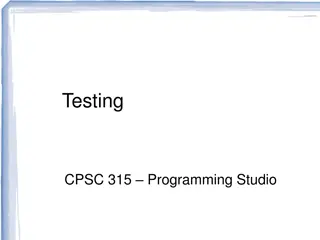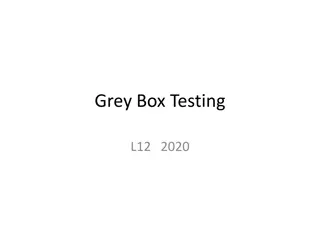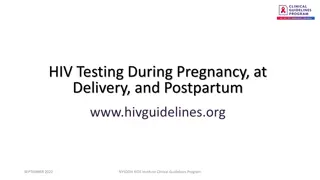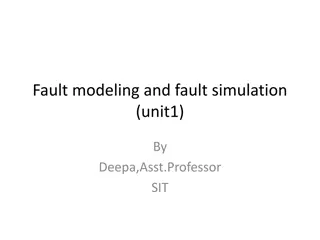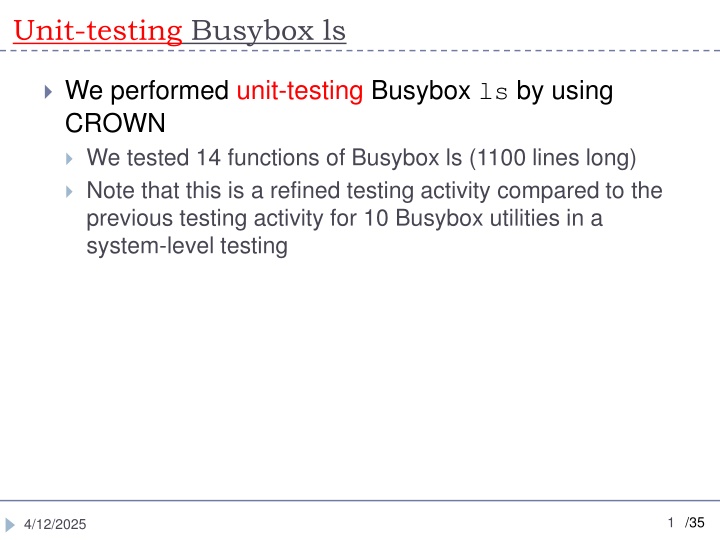
Refining Unit Testing for Busybox ls Functions
Learn about our refined unit testing process for Busybox ls, including testing 14 functions with CROWN, identifying bugs, and improving test oracles based on POSIX specifications. Explore examples and industrial applications.
Download Presentation

Please find below an Image/Link to download the presentation.
The content on the website is provided AS IS for your information and personal use only. It may not be sold, licensed, or shared on other websites without obtaining consent from the author. If you encounter any issues during the download, it is possible that the publisher has removed the file from their server.
You are allowed to download the files provided on this website for personal or commercial use, subject to the condition that they are used lawfully. All files are the property of their respective owners.
The content on the website is provided AS IS for your information and personal use only. It may not be sold, licensed, or shared on other websites without obtaining consent from the author.
E N D
Presentation Transcript
Unit-testing Busybox ls We performed unit-testing Busybox ls by using CROWN We tested 14 functions of Busybox ls (1100 lines long) Note that this is a refined testing activity compared to the previous testing activity for 10 Busybox utilities in a system-level testing 1 /35 4/12/2025
Busybox ls Requirement Specification POSIX specification (IEEE Std 1003.1, 2004 ed.) is a good requirement specification document for ls A4 ~10 page description for all options We defined test oracles using assert statements based on the POSIX specification However, it still required human expertise on Busybox ls code to define concrete assert statements from given high-level requirements 2 /35 4/12/2025
3 /35 4/12/2025
4 Bugs Detected Missing @ symbol for a symbolic link file with F option Missing space between adjacent two columns with i or b options The order of options is ignored According to the ls specification, the last option should have a higher priority (i.e., -C -1 and -1 -C are different) Option n does not show files in a long format -n enforces to list files in a long format and print numeric UID and GID instead of user/group name 1. 2. 3. 4. 4 /35 4/12/2025
Examples for the 4 Bugs Detected 2. Missing space between adjacent two columns with i or b options Output of Linux ls 1. Missing @ symbol for a symbolic link file with F option Output of Linux ls $ ls -i ~user/12345 ~user/11111 154930324 /home/user/11111 /home/user/12345 Output of Busybox ls (incorrect behavior) $ ls -F t.lnk t.lnk@ 154930124 Output of Busybox ls (incorrect behavior) $ ./busybox ls -i ~user/12345 ~user/11111 154930324 /home/user/11111154930124 /home/user/12345 $ ./busybox ls -F t.lnk t.lnk 4. n does not show files in a long format 3. The order of options is ignored Output of Linux ls Output of Linux ls $ ls -1C a.txt b.txt $ ls n a.txt -rw-r--r-- 1 1000 1000 5833 Jun 24 2010 a.txt Output of Busybox ls (incorrect behavior) Output of Busybox ls (incorrect behavior) $ ./busybox ls -1C a.txt b.txt $ ./busybox ls n a.txt a.txt 5 /35 4/12/2025 Industrial Application of Concolic Testing on Embedded Software: Case Studies
Missing @ symbol for symbolic link with F option Busybox ls does not print a type marker @ after a symbolic link file name, when -F is specified and a file name is specified in the command line. Output of linux ls: 1. $ ls -F t.lnk t.lnk@ Output of Busybox ls (incorrect behavior): 2. $ ./busybox ls -F t.lnk t.lnk -F means write a marker (/*|@=) for different type of files. t.lnk is a symbolic link, which links to file t in the directory ~yang/ We found that the bug was caused by the violation of a precondition of my_stat() /35 6 4/12/2025
Calls Graph of Busybox ls buggy behavior Replaced by unit-stat() and unit-lstat() for unit-testing unit-stat unit-lstat Replaced by unit-stat() and unit-lstat() for unit-testing unit-stat unit-lstat correct behavior /35 7
Stub Function unit-stat(), unit-lstat() struct stat { mode_t st_mode } stat() File System file1 struct stat { mode_t st_mode } lstat() struct stat { mode_t st_mode //symbolic value } unit- stat() File System struct stat { mode_t st_mode //symbolic value } unit- lstat() 8 /35 4/12/2025
Symbolic Environment Setting Symbolic variables: Command line options Replacing unsigned int opt with a symbolic value. opt = getopt32(argv, ); Target file status we partially simulate status of a file (struct stat dstat) in a file system by a symbolic value Symbolic stubs: stat() and lstat() are replaced by unit-stat() and unit-lstat() for generating symbolic file status stat(const char *path, struct stat *buf) lstat(const char *path, struct stat *buf) /35 9
Testing target function: my_stat static struct dnode *my_stat(const char *fullname, const char *name, int force_follow) Test oracles (cont.): len (fullname) >= len(name) When fullname is a real file name, the following condition should be satisfied: (cur!=NULL && cur->fullname==fullname && cur->name==name) struct dnode { const char *name; const char *fullname; /* point at the next node */ struct dnode *next; smallint fname_allocated; /* the file stat info */ struct stat dstat; } 1. 2. struct stat { dev_t st_dev; /* ID of device containing file */ ino_t st_ino; /* inode number */ mode_t st_mode; /* protection */ nlink_t st_nlink; /* number of hard links */ uid_t st_uid; /* user ID of owner */ gid_t st_gid; /* group ID of owner */ dev_t st_rdev; /* device ID (if special file) */ off_t st_size; /* total size, in bytes */ blksize_t st_blksize; /* blocksize for filesystem I/O */ blkcnt_t st_blocks; /* number of blocks allocated */ time_t st_atime; /* time of last access */ time_t st_mtime; /* time of last modification */ time_t st_ctime; /* time of last status change */}; /35 10
Testing target function: my_stat static struct dnode *my_stat(const char *fullname, const char *name, int force_follow) Purpose: my_stat gets file status by fullname, and store file status in struct dnode *cur which is returned by my_stat If a file/dir entry corresponding to fullname is available in the file system, cur->stat should stores the corresponding file info. Otherwise, NULL is turned. Test oracles: If any of -d, -F, or -l options is given, and -L option is not given, follow_symlink should be false ((-d || -F || -l) && !-L) -> !follow_symlink 1. 2. 1. -d: list directory entries instead of contents, and do not dereference symbolic links -F: append indicator (one of */=>@|) to entries -l: use a long listing format -L: when showing file information for a symbolic link, show information for the file the link references rather than for the link itself t.lnk t (stat_t_lnk) (stat_t) /35 11
With -F without -L, the last parameter of my_stat() becomes true,when my_stat is called directly from ls_main() Assertions in my_stat 1. static struct dnode *my_stat(const char *fullname, const char *name, int force_follow) 2. { 3. #ifdef ASSERTION 4. assert(strlen(fullname) >= strlen(name)); 5. #endif 6. struct stat dstat; 7. struct dnode *cur; 8. IF_SELINUX(security_context_t sid = NULL;) 9. #ifdef ASSERTION 10./* If any of -d, -F, or -l options is given, and -L 11. * option is not given, ls should print out the status 12. * of the symbolic link file. I.e., 13. * ((d || F || l) && !L) -> !FOLLOW_SYM_LNK 14. */ 15.unsigned char follow_symlink = 16. (all_fmt & FOLLOW_LINKS) || force_follow; 17.assert(!((opt_mask[2] || opt_mask[17] || opt_mask[4]) 18. && !opt_mask[19]) || !follow_symlink); 19.#endif 20. if (follow_symlink) { /*get file stat of link itself*/ 21. // 22.#if !CROWN 23. if (stat(fullname, &dstat)) 24.#else 25. if (unit_stat(fullname, &dstat)) 26.#endif 27. { 28. bb_simple_perror_msg(fullname); 29. exit_code = EXIT_FAILURE; 30. return 0; 31. } 32. } else { /*get file stat of real file which sym_lnk linked to*/ 33. // 34.#if !CROWN 35. if (lstat(fullname, &dstat)) 36.#else 37. if (unit_lstat(fullname, &dstat)) 38.#endif 39. { 40. bb_simple_perror_msg(fullname); 41. exit_code = EXIT_FAILURE; 42. return 0; 43. } 44. } 44. cur = xmalloc(sizeof(*cur)); 45. cur->fullname = fullname; 46. cur->name = name; 47. cur->dstat = dstat; 48. IF_SELINUX(cur->sid = sid;) 49. return cur; 50. } /35 12
















